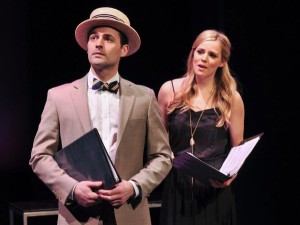Filichia Features: A Delicious Tenderloin
Filichia Features: A Delicious Tenderloin
Yes, the opening song is called “Bless This Land,” but let’s also bless the York Theatre Company for reminding us that Tenderloin is a blessedly good musical.
James Morgan’s troupe finished its Sheldon Harnick festival with a solidly staged reading of the 1960 show. Director Carl Andress demonstrated that Tenderloin is a viable title that can bring a peck of pleasure to many audiences.
So why did it run only six months when first produced? Harnick, along with producers Robert E. Griffith and Harold S. Prince (as the latter was then known), bookwriters George Abbott and Jerome Weidman and composer Jerry Bock couldn’t have been too surprised; they were all show-biz vets who knew that once you have a smash hit, people expect your next show to be even greater. How could they trump the ace that was Fiorello! – one of only five musicals to win both the Best Musical Tony and the Pulitzer Prize?
Now, more than a half-century later, if you produce Tenderloin, Fiorello! won’t be a factor or a detriment to its success.

Abbott directed Tenderloin, too, and made two crucial casting mistakes that you must avoid in your production. One involves the Reverend Doctor Brock, the 19th century preacher who’s determined to close down “the Tenderloin,” so-named because the monetary level of bribes to keep this red-light district lit was on the expensive side.
Maurice Evans got the part. He was an on-the-way-down actor whose great days had seen him performing a good deal of Shaw and Shakespeare. Evans didn’t possess any prepossessing singing pipes, but that wasn’t a barrier in this era after Rex Harrison’s My Fair Lady triumph; suddenly a great voice wasn’t required for a musical lead.
The key to the character is shown in a wise Harnick lyric. Brock is at Coney Island on a lovely summer afternoon. Mr. Purdy, a staunch churchman, rushes up to the minister to complain that he’s not doing enough to rid the region of vice and corruption. Brock sincerely addresses Purdy as “Dear Friend,” en route to singing “this is much too nice a day to talk of that.” Yes, even a crusading preacher takes time off to smell the salt water – not to mention dance a bit.
So instead of making Brock your elderly fire-and-brimstone type, give that characterization to Mr. Purdy, one of those men who believes that he’s even holier than the church. En route, ensure that Brock is a human being first and a religious zealot second. Just as Brock urges everyone to hate the sin but not the sinner, audiences must first like the man as a man even if they think he’s overreacting.
Or is he? Late in the show, Brock tells corrupt Police Lieutenant Schmidt that “This prostitution which you are trying to justify spreads disease and crime and degradation and misery.” Make your Brock stress that eliminating what goes on in the Tenderloin won’t just be a boon to The Lord, but to society in general.

The show also involves Tommy Howatt, a young tabloid reporter who’ll do a-n-y-t-h-i-n-g to get a good story. If that means double-crossing either Brock or Schmidt, so be it. Tommy soon finds that if you burn the candle at both ends, the only place left you’ll have to hold the candle in the middle – which means that you’ll eventually be burned by both sides.
Tenderloin is as much his story as Brock’s.
Abbott made his other fatal casting mistake here. Ron Husmann had a glorious voice, but one that he couldn’t imbue with much character. The way he sang suggested he had little idea of what the lyrics meant. He was all about having the audience say, “Gee, what a voice!” when they should have been sorting through their feelings about Tommy.
Yes, a great Irish tenor voice is welcome in “Artificial Flowers,” which Tommy sings to be admitted into the choir (and infiltrate). It’s a nice parody of the “art song” that was so prevalent in the 1890s and was meant to be arch, so Husmann didn’t do badly by it. But Tommy needs more bite when he sings his other songs, which Max von Essen, a fine musical theater performer, gave him at York. The look of triumph on his face after he passed his audition made us happy for him.

So when looking to hear the score, avoid the original cast album with Evans and Husmann. A far better guide to what Tenderloin should be can be found in the 2000 recording made when the show was mounted at City Center’s Encores! There’s a reason why the sample selections that Music Theatre International offers come from this album. David Ogden Stiers seems younger and more alive as Brock and Patrick Wilson has a street-smart sound as Tommy.
Both recordings, however, show some sassy singing from the ladies of the evening in the show’s best songs. What fun is “Reform,” in which the joie de filles know that it comes around with the inevitability of a new season. They also find time to praise “Little Old New York” (where they do so well that “there’s enough left over to tip the cop on the beat”) and laud the underground financial system in the rollicking “How the Money Changes Hands.”
Tenderloin didn’t run as long as Bock and Harnick’s subsequent shows She Loves Me, Fiddler On The Roof, The Apple Tree and The Rothschilds, but its score is just as effective in establishing time, place and mood. Your cast will have a wonderful time learning all of them. What’s more, Tenderloin has a phenomenal overture, opera bouffe in style, and with a trumpet part that any soloist would love to play.
Abbott and Weidman’s book has quite a plot twist. Brock goes undercover to find out just what goes on in those brothels. Alas, this leads to an incriminating photograph. Meaning Brock succumbed? No – even in that era when Photoshop was still close to a century away, people knew how to doctor pictures. Brock is victimized and Tommy now finally chooses what side he’ll endorse by vindicating him. The Tenderloin is closed down, and soon Brock is off to rescue “Little Old Detroit” (a city that Harnick probably chose because the accent on “Detroit” is on the second syllable, just as it is in “New York”).

So how profane is Tenderloin? One of the most important subplots has Joe, a lonely local, going to the brothelhood of man to talk. That’s it: talk. He spends his money and time platonically with Nita. Not much time passes before he wants to take her away from all this – and does in marriage. That’s as raunchy as Tenderloin gets.
These too are fine roles for two middle-aged performers. More we cannot wish you than to wish that your two will be as tender as Wayne Pretlow and as hopeful as Zakiya Young were at York.
And in this era where we’re all looking for free publicity and corporate sponsorship, don’t hesitate to approach your local steak house for advertising, meal-theater packages and sweetheart deals. If there’s one musical to which a steak house owner should relate, it’s Tenderloin.
 You may e-mail Peter at pfilichia@aol.com. Check out his weekly column each Tuesday at www.masterworksbroadway.com and each Friday at www.kritzerland.com. His new book, Strippers, Showgirls, and Sharks – a Very Opinionated History of the Broadway Musicals That Did Not Win the Tony Award is now available at www.amazon.com.
You may e-mail Peter at pfilichia@aol.com. Check out his weekly column each Tuesday at www.masterworksbroadway.com and each Friday at www.kritzerland.com. His new book, Strippers, Showgirls, and Sharks – a Very Opinionated History of the Broadway Musicals That Did Not Win the Tony Award is now available at www.amazon.com.
Share
Callboard
-
Shake and shimmy it with the #Hairspray20Challenge! Join MTI and Broadway Media in celebrating 20 years of #Hairspray. Duet this here or find us on TikTok! Special thanks to @broadwaymedia and @jammyprod. Choreography Guides are a licensor official resource that provides step-by-step instruction from Broadway and professional choreographers for your productions! Visit @broadwaymedia to learn more. #mtishows #youcantstopthebeat #hairspraymusical #goodmorningbaltimore
View on Instagram


























